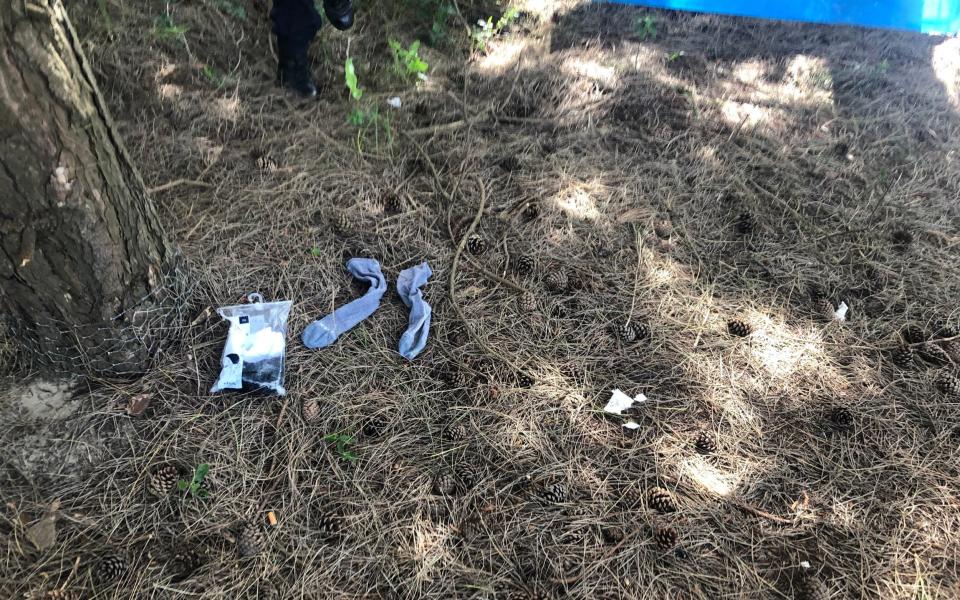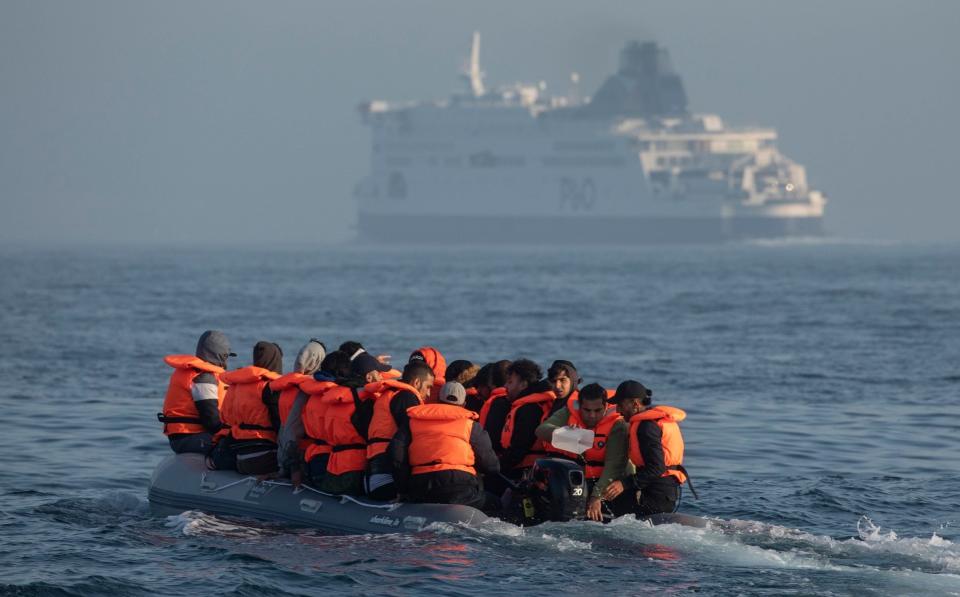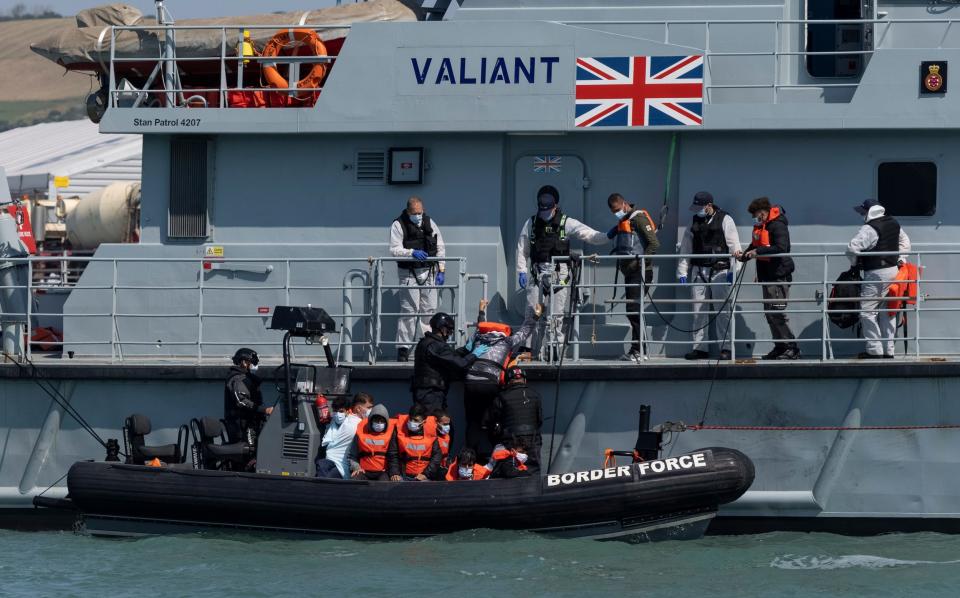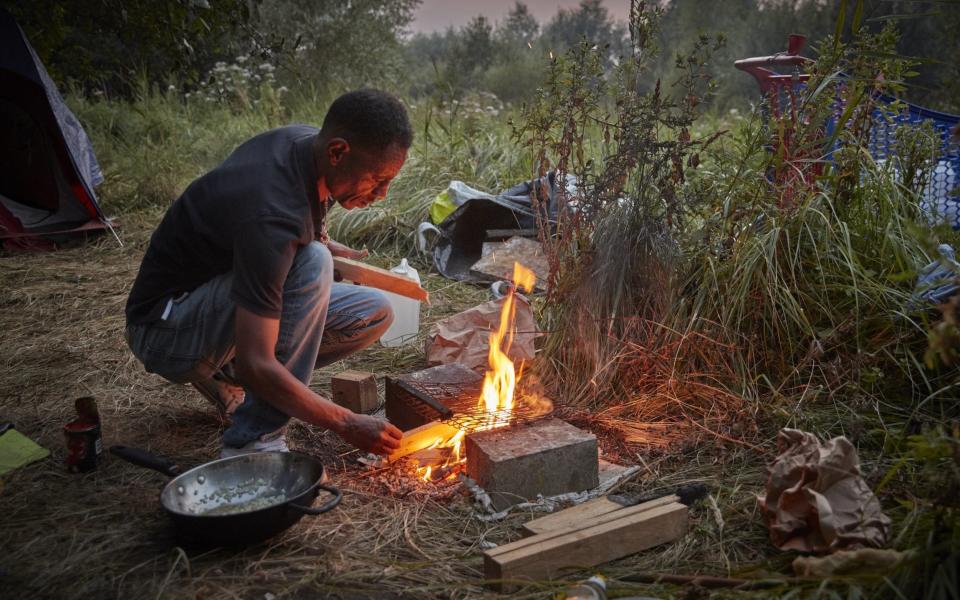French gendarmes find nothing but inflatable boat instructions on hopeless hunt for migrants

Under the shade of the pine trees a few hundred yards away from the beaches stretching for miles along the Calais coast lies an instruction manual.
Next to a pair of discarded socks, the small booklet holds vital details on how to inflate a dinghy.
It is the last trace of suspected migrants who risked their lives to pack into a tiny boat and cross one of the world's busiest shipping lanes before the sun rose.
It is also the best a team of local gendarmes can do in their daily hunt for elusive migrants. With a record rise in crossings and thousands of migrants now waiting to cross, French police are struggling to control the surge.
“We’re all interested in stopping this,” says General Frantz Tavart, who manages a team of 200 gendarmes that have been tasked with securing a 45-mile stretch of coastline that covers the Pas-de-Calais region.
Pointing north towards the English coastline, he adds: “If we keep letting crossings happen, we keep sending a message to migrants that they can easily get across. No one wants to send that message. You could say France and the UK are in the same boat on that point.”

Asked if doubling the number of gendarmes to 400 - as is planned under a new agreement for the UK to send France £54 million to fight illegal migration - would put a big dent in achieving that goal, the general shrugs.
“In theory, I guess it could,” Tavart says.
Others don't hold out much hope either.
The new money being pumped into France comes after British authorities counted a record 430 migrant arrivals on Monday.
It also follows a £28 million package sent last October for French border forces to increase patrols on beaches to stop migrants from entering the channel.
Pierre-Henri Dumont, the Conservative French MP based in Calais, told The Telegraph the payments sent to France represented a “vicious” cycle of wasteful spending that threatened to harm relations between France and British taxpayers.
Below the woodland the Mine d’Or beaches sweep 7km along the coast. On the beachfront of the town of Wissant, a local named Daniel Fourdin comes by to say hello to the patrolling gendarmes.

The 69-year-old says he first started seeing migrants attempt to board inflatable rafts from late 2017.
“I tell them don’t go, the water may look calm from here, but you’re going to get eaten by crabs!”.
Surrounded by gendarmes, Fourdin humbly admits the smugglers and migrants in the area are only getting better at playing this cat and mouse game.
“Even right now, you know they’re watching us, right?” he said. “We may not see them. But they can see us.”
Since the start of the year, Tavart says his team has successfully detained just six smugglers. That hasn’t been enough to stop more than 6,000 migrants from successfully crossing the Channel so far this year.
In Calais, people across the political spectrum from left-wing NGOs to conservative MPs have attacked the latest financial deal between France and the UK as ineffective, wasteful, even dangerous.
“A border is not a door, you can’t just close it,” said Pierre Roques, a coordinator for the NGO Utopia 56, which distributes food and other supplies to migrants in Calais and the surrounding region. “The only difference this is going to make is that migrants will be forced to take more risks to put their lives in danger, which they will. That’s not a solution.”

According to Roques, there are currently around 2,500 migrants living in Calais alone, nearly double the amount from just seven months ago.
According to the French Interior Ministry, the money will be used to double the number of patrols on the French coastline, purchase new smart technologies to detect migrants preparing to cross the channel, and fight against smuggling networks, which have grown more sophisticated in recent years.
Instead of funneling more money into border patrols, Mr Dumont said France should instead focus on creating more administrative detention camps for migrants and then help them fill out asylum applications.
Ahead of a visit to Calais on Saturday, Gerald Darmanin, the French interior minister, insisted the money coming in from the UK was helping control the situation. The pressure is problematic for his boss Emmanuel Macron, with an election looming next year.
Xavier Bertrand, a rising star of the opposition Conservatives, in a recent open letter called for a new camp of 500 migrants in Calais to be dismantled.
In an abandoned field next to a hospital on the outskirts of Calais, The Telegraph saw hundreds of migrants queuing for food. Of the dozen The Telegraph spoke to, none said increased patrols would stop them from trying to cross the channel into England.

“What am I afraid of anymore? I’ve been forced to sleep outside for months, and the [French] police have physically harassed me multiple times,” said Dawda, a 17-year-old from the Gambia who then pointed to various burn marks and blisters on his arms. “The police,” he said, raising his eyebrows. “The French system is really crazy.”
Another man, Kevin A, from Nigeria, said he would stay in France if he could find a way to work, even under the table, while waiting for his asylum application to be processed.
“But I’ve been here for months, and I haven’t even secured any housing,” the 40-year-old engineer said. “What the UK should do is persuade France to make it easier for us to stay here.”
Back among the pine trees away from the beach, police find mobile phone Sim cards cut up into pieces. There is also a ticket dated July 20 - a day after the record was broken for migrant Channel crossings.
Mr Tavart is not optimistic about breaking the migrant trail. “Calais is not [the migrants] final destination. It will always be the last stop before England.”
“Calais is not a back door to Britain,” President Macron said when he visited the port city in 2018, insisting he wouldn't tolerate another migrant camp under his watch.
The Calais "Jungle," which became Europe's largest migrant camp with more than 7,000 people, was dismantled in late 2016.

